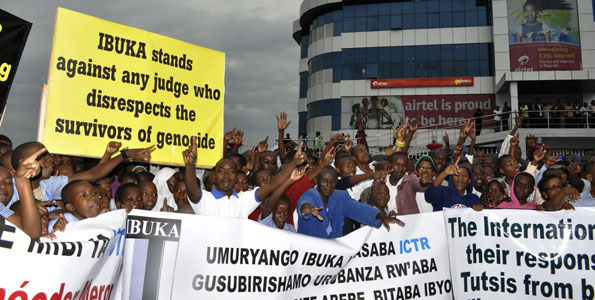The National Commission for the Fight against the Genocide (CNLG), has called for a review of the controversial decisions by American judge Theodor Meron concerning masterminds of the Genocide against the Tutsi.
Meron, 86, is the president of the Mechanism of International Criminal Tribunals (MICT), which was established to take on the cases left by the International Criminal Tribunal for Rwanda (ICTR) that closed last year.
The latest development follows a decision last week by Meron to grant early release to two convicted Genocide masterminds, Ferdinand Nahimana and Father Emmanuel Rukundo who had been incarcerated in Mali.
“CNLG particularly urges the UN Security Council to swiftly review the decisions taken by Judge Theodor Meron and take action to save the credibility of the residual mechanism and international justice at large,” reads a statement issued yesterday by the commission’s Executive Secretary, Dr Jean-Damascene Bizimana.
Nahimana, who was part of the infamous Media Trial by the ICTR, was serving a 30-year sentence before he was granted early release last Wednesday, while the same decision cut short the 25-year sentence for Rukundo, a former military chaplain.
Meron, who also presided over the Appeals Chamber of the UN-backed ICTR before it was taken up by the Mechanism, is also responsible for series of other controversial decisions that saw some of the Genocide masterminds acquitted on appeal, despite convictions on first instance by the Trial Chamber.
Some of those who were acquitted on appeal include Protais Zigiranyirazo, Justin Mugenzi, Prosper Mugiraneza, Augustin Ndindiriyimana, Francois Xavier Nzuwonemeye.
At least five people who were members of the cabinet that executed the Genocide were freed on appeal.
In other instances, Genocide architects like Theoneste Bagosora had their prison sentences reduced from life to 35 years on appeal by Meron, who has also granted early release to eight other convicts besides Nahimana and Rukundo.
“The controversial decisions that have been incessantly taken by Judge Theodor Meron, beg for urgent investigation…these decisions have only served to benefit genocide perpetrators,” reads the statement.
Undue influence
The belief that Meron could have ulterior motives is reinforced by allegations made in 2013 by a member of the then ICTR Appeals Chamber bench, Danish judge Frederik Harhoff, saying that Meron was exerting undue influence on judges to pass rulings in favour of Genocide convicts.
Harhoff’s allegations were made in a five-page open letter that he authored and was published by Danish newspapers.
The Danish judge also served under Meron at the International Criminal Tribunal for the ex-Yugoslavia.
Speaking to The New Times, yesterday, genocide researcher Tom Ndahiro described Judge Meron’s order for the early release of Nahimana, as ‘disgusting’.
“Justice Meron has been a disgrace to the whole process of justice towards Genocide cases… this is not the first time he has made such a controversial order regarding Genocide convicts,” he said.
Ndahiro suggested that the UN Security Council, which oversees the functions of the tribunal, puts in place a mechanism that checks the excessive powers that Meron has, saying had this been in place, he wouldn’t have overseen the dozens of controversial decisions that have only served to benefit genocide perpetrators at the expense of the Genocide survivors.
Meanwhile, commenting on the way forward in a subsequent interview, Bizimana told The New Times that government will, through existing diplomatic channels, write to the UN Security council asking them to examine Meron’s decisions, with hope that these will be reversed.
‘We are putting together a file, that will be submitted by Rwandan Permanent Mission to the UN, to engage the UN Security council regarding this matter,” Bizimana said.
©Alleastafrica and The New Times



